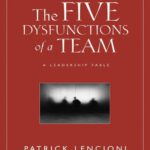Reading Time: < 1 min It’s always good to be able to solve a problem, but it’s often far better to help make the problem crystal clear before you try to solve it. I was recently watching the excellent movie “Moneyball”, and this scene shows exactly what I’m talking about: The scouts are all trying to solve the problem and […]
Leadership
Who is the best listener you know?
Reading Time: < 1 min I was recently reading Kevin Paul Scott’s “Inspired Every Day“, and one little statement he made hit me very hard. He simply said: “Who is the best listener you know? What is that person’s impact on you and others?” It hit because this should (in theory) be me, but it’s not. It’s hard to really […]
If you’re a leader, you’re a teacher
Reading Time: < 1 min Jim Sinegal was one of the cofounders of Costco and had some amazing quotes captured over the years. My favorite, while not related to this post, was what he told his successor as he was stepping down: “If you raise the effing hot dog, I will kill you. Figure it out.” For today’s quote, though, […]
Your personal board of directors
Reading Time: 2 min Having a personal board of directors would be amazing. I’m on a few boards with other organizations, but it’d be neat to have my own — I could just have a group of people to call on to answer questions and help me work through things. As it turns out, I have one! Most of […]
Teamwork requires trust
Reading Time: 2 min One thing that I love about having a relatively small team (it’s myself and Ali, and then seven others) that are full-time employees instead of contractors is the trust that can be built. You certainly can build trust with larger teams and with part-time or contract employees, but it gets more difficult. Having people by […]
Say something
Reading Time: < 1 min We have a fantastic team at GreenMellen, but that can lead to situations where if someone on the team is doing a great job with their work, it can often go unnoticed. “Of course they did great work on x, that’s their job“. It’s explained much more eloquently in Patrick Lencioni’s book “The Ideal Team […]
Decentralized Command
Reading Time: < 1 min When you’re a solopreneur, working on your own, you need to control every decision. It can be brutal, but necessary. As your company grows, though, getting out of making every decision is the best thing you can do. It can also be very tough, but also very necessary. In his book “The Dichotomy of Leadership“, […]
Share with context
Reading Time: < 1 min As my team will tell you, I’ve been bad over the years about forwarding information to them with just one line from me: “Thoughts?”. That’s not helpful. When I sent those items, such as a review of a new software tool, I legitimately just wanted to hear their overall feedback. However, it could also be […]
What matters is doing the right thing
Reading Time: < 1 min There are two kinds of people in the world: There is certainly some crossover there, but if your focus is always trying to “be right” you might miss opportunities to shift gears and do the right thing. In Kim Scott’s book “Radical Candor“, she shares this thought from Steve Jobs about being right. I don’t […]
Standards over obedience
Reading Time: < 1 min Generally speaking, there two big ways to get your team to do what needs to be done. Obedience: You can require obedience, with a very detailed list of what needs to be done, and expect them to follow it to the letter. If you’re flipping burgers at McDonald’s, this is how it needs to be. […]









